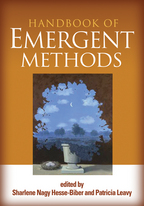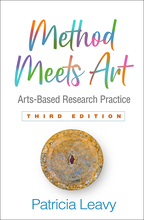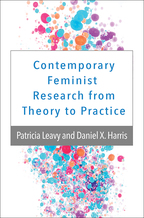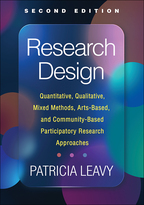Handbook of Emergent Methods
Edited by Sharlene Nagy Hesse-Biber and Patricia Leavy
HardcoverPaperbacke-bookprint + e-book
Hardcover
orderFebruary 22, 2008
ISBN 9781593851477
Price: $147.00 740 Pages
Size: 7" x 10"
Paperback
orderNovember 3, 2010
ISBN 9781609181468
Price: $98.00740 Pages
Size: 7" x 10"
Read a Q&A with featured author, Patricia Leavy!
Sign up for emails on upcoming titles by Patricia Leavy (with special discounts)!
Sign up for emails on upcoming titles by Patricia Leavy (with special discounts)!
“Hesse-Biber and Leavy present a comprehensive overview of emergent research issues as well as potentially powerful innovations in research processes and methods practices in the social and behavioral sciences. The Handbook is designed to both encourage established researchers to explore new research tools and lenses and thereby enrich their practices, and to inform graduate students as they design studies to answer their research questions. The Handbook's authors do an admirable job of locating the reader inside an exciting world of novel and cutting-edge research methods, guided by theory and research, and presented by scholars representing a wide range of disciplines. The text is suitable for graduate-level methods courses in education, psychology, the humanities, and health service fields....The major strengths of the Handbook are its accessibility, organization, and comprehensiveness. Hesse-Biber and Leavy have written skillfully in their articulate, clear introductions to the overall text and each of the three sections. The chapters in the three sections are logically presented, enabling the reader to quickly and clearly discern the major topic areas. The comprehensiveness of the sections is impressive as they draw upon a diverse array of scholars, representing many social science disciplines. The chapter authors have succeeded, too, in making each chapter consistently accessible to the typical graduate student. These authors lead the reader through sensible, contextually embedded discussions of theoretical and practical issues pertaining to emergent research methods and practice....[It] makes an important contribution to social science and behavioral research because of its organization, readability, comprehensiveness, and usefulness to both accomplished researchers and graduate students.”

—Journal of Mixed Methods Research
“The book's philosophic orientation toward the perspective of a researcher attempting to solve a conundrum facing him or her in human science research closely mirrors the research demands that confront the health science professional....Will be of interest to health science researchers who position themselves on the research landscape between qualitative and quantitative research and who understand the history of the research methods they are using.”

—Qualitative Health Research
“Offers a panoramic view.”

—Qualitative Sociology Review
“This book covers a wide range of methods, which are described and discussed by an interdisciplinary (i.e., anthropology, communication, criminal justice, education, geography, human development, psychology, social work, sociology) group of authors, who provide interesting examples of how they use these methods in work....Sharlene Hesse-Biber and Patricia Leavy have assembled a very interesting set of chapters, and even experienced researchers will find much to learn about emergent methods and much to consider about how they might use these in their own work....Should be accessible to upper level students. Readers of might want to order a copy of the Handbook of Emergent Methods for their university libraries and consider adding some chapters to their syllabi.”

—Sex Roles
“Makes a real contribution to the researcher’s toolbox....The quality of the chapters is outstanding and the editors’ introductions to the sections are very helpful....Appropriate for graduate-level methods courses and useful to researchers, both experienced and beginning....Highly recommended. Graduate students through faculty and professionals.”

—Choice
“One important handbook that has the power to encourage educational researchers to breakdown archaic boundaries and try something different….Offers readers a wealth of resources distributed across numerous, concisely written introductory chapters.”

—British Educational Research Journal
“A 'must read' for anyone interested in remaining current with developing research techniques. The book provides a wealth of information regarding innovative approaches that will permit the investigation of novel research questions.”

—Larry Christensen, Chair, Department of Psychology, University of South Alabama
“In the rapidly changing domain of qualitative methods, this comprehensive handbook places qualitative inquiry in context and provides a much-needed, in-depth view of the latest developments. The book describes the 'roots' of the major qualitative methods and how they are developing, outlines innovations in research design and analysis, and explores the impact that these developments are having on methods per se. Hesse-Biber and Leavy are to be congratulated for bringing together leaders in the field to create this seminal work, which will have a profound impact on qualitative methods.”

—Janice M. Morse, Professor and Barnes Presidential Endowed Chair, College of Nursing, University of Utah
“Methods determine not only how we see, but also what we can see. This comprehensive handbook details creative new approaches to asking and exploring questions within the social sciences. These approaches offer liberation from the narrowing straits of logical positivistic measurement and quantification, and chart the paths to addressing more socially meaningful questions. They provide means for examining social reality with fresh tools. The range of chapters on different emergent methods will be enlightening to both new and experienced researchers.”

—Ruthellen Josselson, School of Psychology, Fielding Graduate University
“With contributions from both emerging and established methodological scholars, this innovative, engaging work articulates a view of research less as a linear series of stages than as an unfolding and evolving process. This orientation is in tune with changes in theoretical underpinnings of research that underline many contemporary methodological approaches, including participatory, feminist, and other inclusive approaches. Readers are offered fodder for beginning to think outside of the traditional methodological box and for revitalizing such methods as focus group interviewing and oral history. This book will be of value to both novice and more well-established investigators who wish to pursue their research endeavors more flexibly, reflectively, and inclusively.”

—Bruce L. Berg, Department of Criminal Justice, California State University, Long Beach
“Hesse-Biber and Leavy's timely and constructive response to the collapse of disciplinary authority and the postmodern challenge in the social sciences does not take an 'anything goes' position. The editors and their collaborators argue for a principled and rational approach to orchestrating research that welcomes and evaluates a bewildering array of emergent methods in the social sciences. This handbook both provides invaluable, specific guidance to researchers and frames the notion of methodological emergence as a theoretical challenge in its own right.”

—Davydd J. Greenwood, Goldwin Smith Professor of Anthropology, Cornell University
“This is a powerful and valuable work for anyone involved in social science research. Hesse-Biber and Leavy have called together many experienced writers in qualitative methods to explore the emergent methods so critical to the current time. Whether deconstructing document research, arts-based approaches, or historical methods, or extending our understanding of interviewing, performance ethnography, and participatory approaches, all of the chapters provide greater clarity about how we do what we do in the qualitative research community. If their goals were to illuminate, transform, and inspire, these editors and contributors have certainly hit their mark. This book is a gift to both students and teachers of emergent methods.”

—Valerie J. Janesick, Department of Educational Leadership and Policy Studies, University of South Florida
—Journal of Mixed Methods Research
“The book's philosophic orientation toward the perspective of a researcher attempting to solve a conundrum facing him or her in human science research closely mirrors the research demands that confront the health science professional....Will be of interest to health science researchers who position themselves on the research landscape between qualitative and quantitative research and who understand the history of the research methods they are using.”
—Qualitative Health Research
“Offers a panoramic view.”
—Qualitative Sociology Review
“This book covers a wide range of methods, which are described and discussed by an interdisciplinary (i.e., anthropology, communication, criminal justice, education, geography, human development, psychology, social work, sociology) group of authors, who provide interesting examples of how they use these methods in work....Sharlene Hesse-Biber and Patricia Leavy have assembled a very interesting set of chapters, and even experienced researchers will find much to learn about emergent methods and much to consider about how they might use these in their own work....Should be accessible to upper level students. Readers of might want to order a copy of the Handbook of Emergent Methods for their university libraries and consider adding some chapters to their syllabi.”
—Sex Roles
“Makes a real contribution to the researcher’s toolbox....The quality of the chapters is outstanding and the editors’ introductions to the sections are very helpful....Appropriate for graduate-level methods courses and useful to researchers, both experienced and beginning....Highly recommended. Graduate students through faculty and professionals.”
—Choice
“One important handbook that has the power to encourage educational researchers to breakdown archaic boundaries and try something different….Offers readers a wealth of resources distributed across numerous, concisely written introductory chapters.”
—British Educational Research Journal
“A 'must read' for anyone interested in remaining current with developing research techniques. The book provides a wealth of information regarding innovative approaches that will permit the investigation of novel research questions.”
—Larry Christensen, Chair, Department of Psychology, University of South Alabama
“In the rapidly changing domain of qualitative methods, this comprehensive handbook places qualitative inquiry in context and provides a much-needed, in-depth view of the latest developments. The book describes the 'roots' of the major qualitative methods and how they are developing, outlines innovations in research design and analysis, and explores the impact that these developments are having on methods per se. Hesse-Biber and Leavy are to be congratulated for bringing together leaders in the field to create this seminal work, which will have a profound impact on qualitative methods.”
—Janice M. Morse, Professor and Barnes Presidential Endowed Chair, College of Nursing, University of Utah
“Methods determine not only how we see, but also what we can see. This comprehensive handbook details creative new approaches to asking and exploring questions within the social sciences. These approaches offer liberation from the narrowing straits of logical positivistic measurement and quantification, and chart the paths to addressing more socially meaningful questions. They provide means for examining social reality with fresh tools. The range of chapters on different emergent methods will be enlightening to both new and experienced researchers.”
—Ruthellen Josselson, School of Psychology, Fielding Graduate University
“With contributions from both emerging and established methodological scholars, this innovative, engaging work articulates a view of research less as a linear series of stages than as an unfolding and evolving process. This orientation is in tune with changes in theoretical underpinnings of research that underline many contemporary methodological approaches, including participatory, feminist, and other inclusive approaches. Readers are offered fodder for beginning to think outside of the traditional methodological box and for revitalizing such methods as focus group interviewing and oral history. This book will be of value to both novice and more well-established investigators who wish to pursue their research endeavors more flexibly, reflectively, and inclusively.”
—Bruce L. Berg, Department of Criminal Justice, California State University, Long Beach
“Hesse-Biber and Leavy's timely and constructive response to the collapse of disciplinary authority and the postmodern challenge in the social sciences does not take an 'anything goes' position. The editors and their collaborators argue for a principled and rational approach to orchestrating research that welcomes and evaluates a bewildering array of emergent methods in the social sciences. This handbook both provides invaluable, specific guidance to researchers and frames the notion of methodological emergence as a theoretical challenge in its own right.”
—Davydd J. Greenwood, Goldwin Smith Professor of Anthropology, Cornell University
“This is a powerful and valuable work for anyone involved in social science research. Hesse-Biber and Leavy have called together many experienced writers in qualitative methods to explore the emergent methods so critical to the current time. Whether deconstructing document research, arts-based approaches, or historical methods, or extending our understanding of interviewing, performance ethnography, and participatory approaches, all of the chapters provide greater clarity about how we do what we do in the qualitative research community. If their goals were to illuminate, transform, and inspire, these editors and contributors have certainly hit their mark. This book is a gift to both students and teachers of emergent methods.”
—Valerie J. Janesick, Department of Educational Leadership and Policy Studies, University of South Florida













